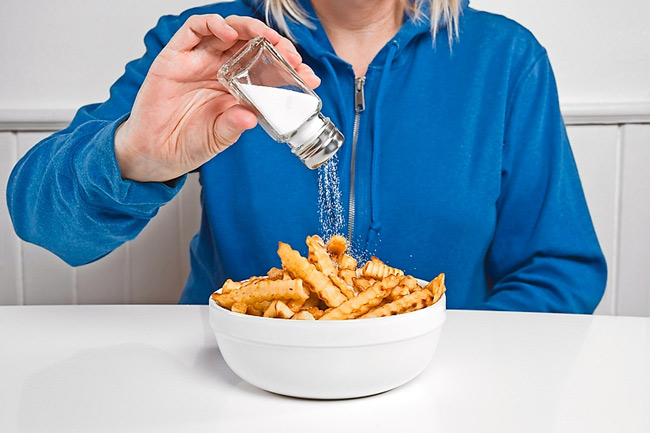
The human body is over 60 percent water. This fluid is to be found in the blood, the lymphatic system and the cells of the body. Sodium, together with chloride, potassium and phosphate, control the amount of fluid within and outside the cells of the body, keeping them evenly balanced. Maintaining this balance is absolutely essential to the body’s proper functioning.
The current recommendation is to consume less than 2.4 grams (2,400 milligrams [mg] ) of sodium a day. That equals 6 grams (about 1 teaspoon) of table salt a day. The 6 grams include ALL salt and sodium consumed, including that used in cooking and at the table. |
TOO MUCH SODIUM
It is estimated that the average person, in average conditions, requires less than 1g of sodium (which equals around 2.5g of salt) per day for proper bodily function. Yet in the Western world current research estimates that the average person eats 10-15 g of salt (4-6g of sodium ) a day – which is between five and ten times more than they need.
Unlike in the case of, say, vitamin C, we do not excrete the salt we do not need, so any excess gets absorbed into our body fluids. If excess sodium appears in the blood, in order to reduce its sodium concentration to normal, water will be drawn out of cells into the blood to dilute it. If yet more salt is eaten, the body will crave more fluid to dilute the excess of sodium –in other words, you will get thirsty.
This will cause you to carry excess fluid – up to several litres, which will put a strain on the vascular system and the heart. This is a common cause of high blood pressure.
TOO LITTLE SODIUM
Insufficient sodium, although rare, is just as dangerous as excess sodium and it will also unbalance the body’s systems. Symptoms include cramps and aching muscles, lassitude, anorexia, vomiting and mental confusion.
Shortage of sodium will normally only affect those who sweat a great deal, as they excrete sodium along with their sweat. This may be because of continuous exercise, for example, or due to heavy manual labour, or because people are living in a climate to which they are not adapted, as with white-skinned northerners living in the tropics. In either case, they may need to take extra salt to replace the sodium lost in their sweat.
Tips for Reducing Sodium in Your Diet
The long-term advantage of any special diet is that it forces you to cook more for yourself at home. Initially this may seem like a terrible punishment, but many people find that once they start they really enjoy more adventurous cooking, and that the health benefits they derive from eating fresh food which also agree with their dietary requirements are well worth the bit of extra work.
There are a few tips that you can apply to all your cooking. Check them out…
- Buy fresh, plain frozen, or canned “with no salt added” vegetables. If you cannot bear not to have salt on your vegetables, lightly rub them with a little salted butter when cooked rather than sprinkling them with salt itself. Vegetables have plenty of flavour of their own, which is only masked by putting a lot of salt in the cooking water – although because it is in the nature of salt to leach out of the food into the water rather than from the water into the food, salted cooking water makes for far less salty food than salting the dish itself.
- Use fresh poultry, fish, and lean meat, rather than canned or processed types.
- Use salt carriers rather than salt itself. For example, if you cannot bear the thought of a boiled egg without salt, add a tiny bit of salted butter to the egg rather than straight salt – you will end up with less salt but still a good flavour.
- Use herbs, spices, and salt-free seasoning blends in cooking and at the table.
- Cook rice, pasta, and hot cereals without salt. Cut back on instant or flavored rice, pasta, and cereal mixes, which usually have added salt.
- Choose “convenience” foods that are lower in sodium. Cut back on frozen dinners, pizza, packaged mixes, canned soups or broths, and salad dressings — these often have a lot of sodium.
- Rinse canned foods, such as tuna, to remove some sodium.
- When available, buy low- or reduced-sodium, or no-salt-added versions of foods.
- Choose ready-to-eat breakfast cereals that are lower in sodium.
- Take stock of the sources of salt in your diet, such as restaurant meals, salt-based condiments, and convenience foods. Some of these are really loaded with salt.
- If you think your meals are high in sodium, balance them by adding high-potassium foods, such as fresh fruits and vegetables.
- Ask about salt added to food, especially at restaurants. Most restaurant chefs will omit salt when requested.
- If you need to salt while cooking, add the salt at the end; you will need to add much less. The longer the food cooks, the more the salty flavor is muted and at the end, the final taste is on the top layer.
Go about the process gradually. Taste your food before adding salt, and only add just as much as you really need to make it acceptable. Measure out the amount of salt you would normally use for any dish, then reduce it by 25 percent. Two weeks later, reduce the new amount that you are using by a further 25 percent, and so on, until you use none at all. This will allow your taste buds to adapt gradually to the more varied flavours of less salty foods.
Unless you have been told to cut salt out of your diet entirely, reduce the amount of salt that you use gradually: this way, you will scarcely notice.

